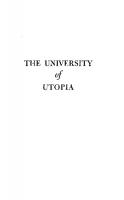Freedom and Responsibility in the University: Report of the Presidential committee on rights and responsibilities of members of York University 9781487583002
Under the chairmanship of one of Canada’s most distinguished jurists, this committee has set out an important and univer
186 29 6MB
English Pages 72 [73] Year 1970
Recommend Papers

- Author / Uploaded
- York University
File loading please wait...
Citation preview
Freedom and Responsibility in the University
Committee members The Honourable Mr. Justice Bora Laskin Chairman Member of the Board of Governors Alex E. Barron Member of the Board of Governors Brian D. Bixley Assistant Professor of Economics Dean of Students, Glendon College John J. Conway Professor of Humanities Master of Founders College Fred P . Nix Student in Founders College John O'Neill Associate Professor of Sociology Brayton Polka Associate Professor of History and Humanities Senior Tutor of Vanier College L. Jeffrey Solway Student in Vanier College 1966 to 1969 Rolly R. Stroeter Student in Founders College 1966 to 1969 Neal Wood Professor of Political Science John P. Wright Graduate Student John A. Becker Secretary Assistant Vice-President
Letter of transmittal Dr. Murray G. Ross President York University
November 12, 1969
Dear Mr. President : On behalf of the Presidential Committee on Rights and Responsibilities of Members of York University, which you established in February, 1968, I submit herewith its Report for your consideration. The Committee was fully constituted as of February 28, 1968, when its total membership of twelve, consisting of two members of the Board of Governors, five members of the Faculty, four students and one graduate student were appointed. There were four changes in the original composition of the Committee . Professor J.E . Broadbent was a member of the Committee for the first six months until his election to the House of Commons. His place was taken by Professor J. O'Neill. Messrs. R.M. Dale and R. Sand did not return to the University for the 1968/ 69 academic year and Mr. Sand's place was taken by Mr. Jeff Solway . The Council of the Glendon College Students Union did not replace Mr. Dale on the Committee. In addition, Mr. B. Tomlin, a graduate student in Political Science, was unable to continue with the Committee and his place was taken by Mr. John Wright. The Committee was disappointed with the slow and small response to its request for submissions, and could not be certain whether this reflected a general satisfaction with the operation of the University or a mark of confidence in the Committee, or neither. At any rate , the Committee is grateful to those who took the trouble to submit briefs or letters and to those who were good enough to appear before the Committee to answer questions and provide insights by reason of their special responsibilities in the University. The Committee wishes to express its deep appreciation to Mr. Gerald Wright , who was its secretary when it was established and for the first five months of its existence until he left to resume graduate studies ; and, more particularly, to Mr. John Becker, who succeeded Mr. Wright and carried the burden of necessary arrangements and of recording the deliberations of the Committee during the heaviest part of its operations, and who assisted significantly in organizing the mass of material which it collected as a basis for this Report.
Yours very truly Bora Laskin Chairman
Freedom and Responsibility in the University
Report of the Presidential Committee on Rights and Responsibilities of Members of York University
The Honourable Mr. Justice Bora Laskin, Chairman
Published for York University by University of Toronto Press
© University of Toronto Press 1970 Printed in Canada by University of Toronto Press Toronto and Buffalo Reprinted in 2018
ISBN 0-8020-3256-7 ISBN 978-1-4875-8172-5 (paper)
Preface
In the course of its deliberations which have resulted in the Report which follows , the Committee realized that it could only provide balance and perspective if it considered issues and faced situations of which there was no experience on York 's campus as well as issues and situations which were within the experience of faculty members, students or members of the administration . In pushing various matters to what may seem to some or many as the extreme, the Committee was doing nothing more than establishing a working frame of reference . York faculty and York students should not have any misgivings about the thrust of this Report merely because it refers to kinds of activity which have been alien to them and which , the Committee feels , will remain alien . What the Committee has had mainly in view was a statement or , as it may appear to some, a restatement of the values on which a University must , in its judgment, operate, and the formulation of machinery to prevent any arbitrary interference with those values . The emphasis is on the protection of and reciprocal respect for the various rights of faculty members and students, on and off the campus, and on the vindication of such rights by due process if they are violated . The Committee is aware that portions of its Report may be regarded as too blunt or too enveloping in areas where distinctions can easily be suggested, but it had to weigh the relative advantages of, on the one hand, establishing norms to be applied in individual cases with prudent discretion and on the other, attempting to anticipate human behaviour in all its variety . The open , and, in the Committee 's hope, the wide discussion that will follow the publication of this Report may bring to the fore better views and better solutions than those of the Committee on the problems it has covered, and may also reveal untouched issues that were within the Committee's terms of reference. It will be all to the good if this happens. The members of the Committee have come through a lengthy and sobering exercise which has left them with little conviction that they have written a Report for York University for all time .
1
Introduction: basic considerations
The Presidential Committee on Rights and Responsibilities of Members of York University was charged, in the words of its Terms of Reference (which are set out in full in Appendix A) "to make recommendations as to the norms that should govern the behaviour and activities of faculty and students in those areas in which the Committee considers that the University has a legitimate concern and as to the institutions or machinery for their enforcement." The Committee has not taken this as a mandate to reconsider the structure and government of the University, nor as an invitation to inquire into academic programmes offered by the University. It has seen its task as an equally telling one, however, consisting of three ,main divisions: (1) sorting out relevant issues of on-









